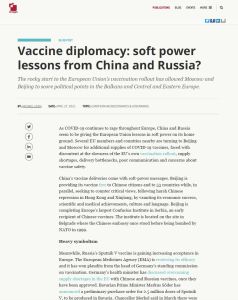Join getAbstract to access the summary!

Join getAbstract to access the summary!
Michael Leigh
Vaccine Diplomacy
Soft Power Lessons from China and Russia?
Bruegel, 2021
What's inside?
The EU’s wobbly COVID-19 vaccine launch has China and Russia aiming for geopolitical traction.
Recommendation
The European Union’s coronavirus vaccine challenges have allowed Russia and China to step in with vaccine supplies as a way to promote their commercial and geopolitical aims. Yet for some Central and Eastern European countries, according to policy expert Michael Leigh in this informative analysis, the appeal of working with Russia and China has less to do with their soft power than their ability to stop-gap vaccine shortfalls. Nonetheless, Leigh offers important ideas on how the European Union can counter this shadow diplomacy.
Summary
About the Author
Michael Leigh is a senior fellow at Bruegel and an academic director at Johns Hopkins University, School of Advanced International Studies.


















Comment on this summary